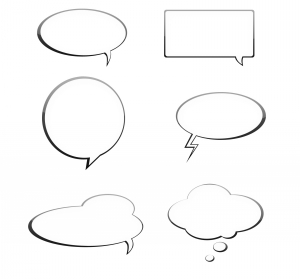“The voice didn’t grab me.”
Uh-oh. Isn’t that feedback one of a writer’s worst nightmares? Voice is one of those things that feels like we either have it or we don’t. And we think we can’t easily change it because our voice is so internal to us.
But all is not lost. We can develop and strengthen our voice over time, and our writing voice can change. Different stories might evoke different tones, different sides of us. Each point-of-view (POV) character will bring their personality to our writing, especially in first person or deep third person stories.
What Makes a Strong Voice
First we have to understand what makes something sound voice-y. In my post about head-hopping vs. omniscient point of view, I shared a great quote from Janice Hardy about voice:
[V]oice is that sense there’s a person behind the words.
Whether we know it or not, we all have a voice. We just need to bring it out, strengthen it, make it sound more like us or our characters.
Strengthening our voice isn’t about being snarkier in our dialogue or more sarcastic in our internal monologues. It’s about learning what we (or our characters) sound like in the “real” word and bringing that to the page. Our voice encompasses everything about how we express ourselves or our characters in written words.
Creating a Strong Voice
The key for me was to think out loud.
By that, I mean to think about how I or my characters would say the thoughts to our BFF or significant other. How would we express our emotions if we trusted the person next to us with our deepest fears? We’ve heard that good writing is about digging deep and exposing our vulnerabilities—this is why.
If we think out loud, we can study our speaking voice (even if we’re speaking only in our head) to strengthen our writing voice. Everyone has a speaking voice. That voice is shaped by accents and dialects, sure, but it goes deeper than that.
Having a broad vocabulary changes how we express ourselves. Our comfort with our emotions/reactions and our audience affects how “real” we are with our words. Our goals with our communication change the tone we use. Our culture affects the rhythm of our words (it’s not just the drawl that makes southern accents sound slower than northern accents in the U.S., and it’s not just the hurry-up city life that creates a fast, rapping-like speech pattern).
Comedians, actors, and oral storytellers all become sensitive to their speaking voice. The tone, rhythm, and sound of their speaking voice controls the audience’s experience.
As writers, focusing on our speaking voice can help us become familiar with what our voice sounds like. What are our patterns, our rhythms, our speaking mannerisms?
A Strong Voice Sounds Natural, Never Forced
Good, clear writing often sounds natural, like speech. So making ourselves aware of our speaking habits will help our writing mimic speech. Writing that reaches that level will make our deep POV narrative and dialogue sound more natural.
Similarly, focusing on others’ speaking habits will give us ideas for how our characters might speak or think. We might model a character’s voice after someone we overhear at the coffee shop or a co-worker (full disclosure: that last one could be dangerous).
This idea to think out loud is yet another reason why reading our work aloud can be a good way to edit. When we trip over words or phrases in speech, they won’t read naturally either. Smooth reading aloud equals clear reading in our readers’ heads.
However, one side effect to creating characters with strong voices is that we could pick up our character’s speech habits. That’s right. In a bizarre turn, my writing voice is affecting my speaking voice. I’m copying mannerisms from the imaginary people my brain created. Very meta. But let’s ignore that issue, because that’s probably just me. *smile*
What have you done to strengthen your voice? Do you “think out loud”? Do you hear your characters’ voices in your head, complete with pitch, rhythm, and accent? Have you used the “read aloud” technique to edit your work? Have your characters or your writing influenced your speaking voice?

